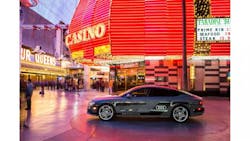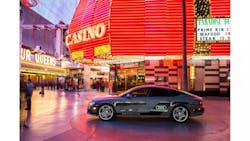A new survey put together by the College of Engineering at Carnegie Mellon University finds that improvements to driver safety may be the key to broader acceptance of autonomous or “self-driving” vehicle technology.
The college polled 1,000 people in the U.S. between the ages of 18 and 70 to figure out the “consumer perspective” regarding self-driving cars. Just FYI: Carnegie Mellon researchers defined the “self-driving car” for survey participants as vehicle equipped with sensors and computing technology that would allow it to safely travel without a driver controlling the steering wheel, gas and brake pedal.
[Further FYI: Carnegie Mellon is no stranger to this new automotive endeavor as the college rolled out its very own self-driving car platform back in 2013 as part of a partnership with General Motors.]
By extension, too, the school stressed to its survey participants that such vehicles would also automatically move at safe speeds, keep a safe distance from surrounding cars, change traffic lanes, obey traffic signals and follow GPS directions to destinations.
From that perspective, Carnegie Mellon’s poll determined that there are 10 “situations” motorists believe will be made less hazardous via self-driving cars. In order they are:
- Night driving
- Unfamiliar areas and roads
- Congested roads
- Bad snowstorms
- Merging traffic situations
- Interstate travel
- City taxi
- Daytime driving
- School bus
- Running errands
With safety in mind, respondents also said they wanted additional features in autonomous vehicles, including driver fatigue warnings (57%) and parental controls to set speed limit, curfew time and number of passengers in the car (83%).
Yet price – as always – proved to be a stumbling block, as a majority of respondents (70%) said they wouldn’t buy a car with self-driving capability if it cost 30% more than a comparable car without it.However that means the remaining 30% WOULD be willing to pay 30% or more for an autonomous vehicle, Carnegie Mellon’s researchers stressed, suggesting to to them at least that there could be "substantial demand" for self-driving cars despite the greater cost.
Drilling down in the data, the school found that Millennials were the most willing to pay a premium price – indicating that they may be early adopters of these vehicles.
Interestingly, men (29%) and women (28%) were almost equal in their willingness to spend more for an autonomous car.
The question is, will any of this translate to the commercial side of the vehicle world? We’ll see.

